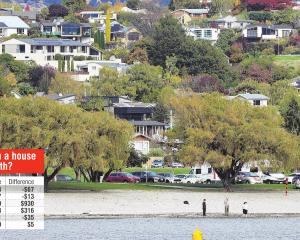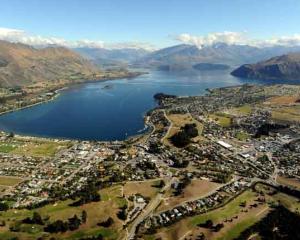
Mr Grubb (75) resigned suddenly from the organisation in December 2022, following an allegation by a staff member of bullying behaviour.
Since then, he’s been taking a break and has found being on holiday suits him.
In March, Mr Grubb said the allegation had been investigated, he was not able or willing to talk about it and he had moved on.
A huge load had been lifted from his shoulders, and he had been due to leave the organisation by the end of March anyway, he said.
"My kids were delighted. They said, we’ve got you back."
After selling his Wanaka home recently and moving to Nelson, he was delighted to be back in town and holidaying with friends at the Outlet Camp.
He had taken the road less travelled from Nelson, driving through the unsealed Mackenzie and Hakataramea passes, taking his time and savouring the journey.
"I will always be blue and gold," he said.
Long-distance adventures are right up his alley — he did a Singapore to London overlander in 2015 and he’s planning more.
Mr Grubb took the helm of the national council in December 2020 at a tumultuous time.
He had earlier chaired a steering group that recommended changes.
Four months after his appointment, then-Conservation Minister Eugenie Sage released a ministerial review of Fish & Game, describing it as an "old boys’ club" and "bloated", with 12 regional councils and 144 elected councillors — more than Parliament’s 120 elected members.
"I spent the next 18 months trying to fix the thing," Mr Grubb said.
Former chief executive Martin Taylor resigned one month after Mr Grubb began as chairman.
New chief executive Corina Jordan was appointed.
Mr Grubb said he was keenly conscious Fish & Game had poor relationships with the dairy industry and that the 12 regional councils were at loggerheads with the national body.
"I was picking up that some Fish & Game councillors were resistant to change and didn’t want more women and Maori on," he said.
"We needed to change the way we think ... My mantra [is] represent our community. For a 75-year-old guy, is that a radical thing?"
Another of his mantras was "respect" — of individual people and organisations, regardless of whether you held a different view, he said.
"It doesn’t mean we can’t oppose them but we don’t have to insult them," he said.
Now, relationships with the dairy industry and between regions were improving and parliamentarians were open to talking, he said.
One thing he wanted to do — and could not because the review steering group was disbanded and he left — was to convince political parties they should all agree to amend the Conservation Act.
Adding seven simple clauses to the act would help introduce a more positive, professional environment, he said.
In summary, the amendments would allow Fish & Game councillors to be paid, reduce the number of councillors to five per region, reduce regions to seven regions and centralise licensing, sales and distribution of funds.
There would be a collective performance report to Parliament, plus two professional directors and one iwi representative appointed to each regional council.
But change has not yet happened.
Some people felt those changes could happen without legislation, Mr Grubb said.
In the meantime, Fish & Game’s fresh water advocacy had achieved 15 water conservation orders — the equivalent of a national park for a river.
As a leading advocacy group with assets of over $40 million and a budget of over $10 million, mostly spent on protecting fresh water, the organisation required professional direction, he said.
"I am worried Fish & Game will not survive the coming storm on fresh water regulations and will be gone."
While Mr Grubb is worried Fish & Game’s future is in doubt if the act is not amended, he feels the right people are at the helm.
"The new CEO is great. We had to wait eight months to get her. And there’s a new chair, Barry Barnes, from Auckland. We had got to the point of 90% acceptance to radical change.
"So as that radical change leader, it was time for me to step aside ... [but] if we don’t get professional directors who understand the rules of behaviour, then Fish & Game will continue to be a relatively dysfunctional organisation," he said.
Mr Grubb has few ties with the national council now — "there’s nothing more dead than a dead chairman" — but he was elected to the Otago Fish & Game Council in 2021 as the highest polling candidate with 583 votes.
Fresh adventures are on his mind.
Some of them involve golf, others fishing.
He’s keen on a trip into the Australian desert, a foray into Iran and a train trip across the "Stans" of Central Asia.
And there’s another long overlander to organise.












